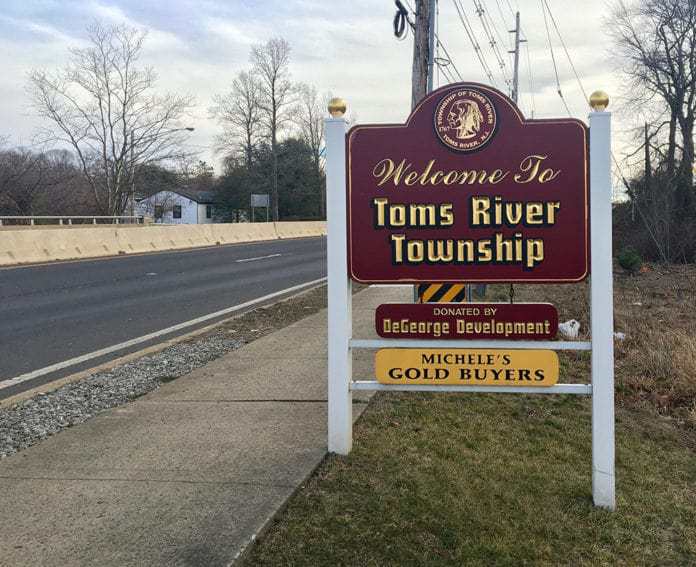
TOMS RIVER – With the federal government carrying a big stick, township officials decided to scale back the amount of land that houses of worship can be built on rather than face legal consequences.
Going back to 2009, zoning ordinances in town have changed. These rules determine what is allowed to be built, and how land owners can use their property.
One of the biggest changes was restricting land that could be used for houses of worship in 2017. They used to be allowed on 2-acre properties. The town changed it to 10 acres.
The specific law that the township was accused of violating was the Religious Land Use and Institutionalized Persons Act (RLUIPA).
Some members of the Orthodox Jewish community saw this as a way to prevent them from moving in to certain areas of town, particularly the northern areas of town bordering Lakewood. This coincided with a rise in anti-Orthodox sentiment online.
The complaint said that Toms River officials revised zoning to exclude the Orthodox, and treat religious assemblies on less favorable terms than nonreligious ones.
Federal law prohibits towns from zoning to exclude any group of people.
Township assistant attorney Anthony Merlino and Marci Hamilton, an expert on religious land use law, spoke at a recent Township Council meeting when the settlement was voted upon.
“The (federal) Department of Justice is right. 2017 was not Toms River’s finest hour,” Hamilton said, referring to the year that some changes were made. “The Department of Justice was going to come down with a hammer” if the town didn’t change back.
As part of the consent decree, the township will revise its zoning code to: reduce the minimum acreage required for a house of worship in many zoning districts from 10 acres to 2 acres; allow houses of worship in certain zoning districts; allow smaller houses of worship to be located on minor collector roads; and treat houses of worship on comparable terms to nonreligious places of assembly. The consent decree also requires the township to train its officials and employees on RLUIPA’s requirements, establish a procedure for receiving and resolving RLUIPA complaints, and other injunctive relief.
The consent order does note that there are areas in Toms River, such as the downtown area, where houses of worship are allowed. It’s just that this is not where the Orthodox Jews are moving.
The settlement essentially rolls the zoning back to before the restrictive changes were made.
“Overall the consent order does not involve a drastic revision of the Township’s zoning ordinances, but returns Toms River to the system that existed for nearly four decades as the Township grew and thrived,” said Hamilton and Merlino said in a joint statement.
The consent order will make local and neighborhood streets off-limits to places of assembly, religious or otherwise, and cap the lot size for such facilities that locate on middle-order roadways. “These were critical neighborhood-protective priorities for the Township and achievable only because we chose negotiation over confrontation,” the Council and Mayor said in a statement.
The consent order frees the township from any liability, which some officials said was a key point.
“A seven-figure payout would not only have diverted funds away from important priorities – police, playgrounds, paving roads, public services – but also would have triggered a massive tax increase,” the Township Council said in a joint statement. “This settlement is both the legally and fiscally-responsible thing to do. No one is served by costly and protracted litigation with the Federal Government. The settlement avoids that.”
“With the Township facing two lawsuits involving houses of worship this agreement between the DOJ and the Township will restore the 2017 zoning regulations and protect Toms River from future lawsuits,” said Mayor Maurice B. Hill. “In addition this settlement will allow the Council and me to focus on Toms River’s efforts to recover from the pandemic and keep our town a welcoming, affordable community for all.”
The council approved the settlement, 6-1, with Councilman Daniel Rodrick being the sole “no” vote.
Rodrick questioned why the township was backing down when they weren’t actually being sued by the government.
Merlino said the township received a notice that the federal government was going to file suit if they didn’t comply.
“You know what difference that makes? Millions of dollars,” he said.
His opinion was that the town needed to settle outside of court, while they still have some control over the outcome, rather than go to court and risk a loss and lose control. They might then have to pay a seven-figure fine, legal fees, and court costs.
The statement from the Department of Justice said that a lawsuit had been filed on the same day that the settlement was announced, and that the settlement would resolve this lawsuit. The suit alleged that the township placed “unreasonable limits on where religious assemblies and institutions may locate, substantially burdens religious exercise, and treats religious assemblies and institutions on less than equal terms with nonreligious assemblies and institution.”
“Federal law protects religious communities against unequal treatment and unwarranted burdens,” Rachael A. Honig, Acting U.S. Attorney for District of New Jersey, said. “Zoning regulations that impose unreasonable restrictions or prevent religious faiths from having a place to worship violate RLUIPA. Through the resolution entered today, this office takes another step to put an end to unlawful zoning practices and vindicate the civil rights of minority religious communities in the District of New Jersey.”
“RLUIPA protects people of all faiths in their right to exercise their religion,” said Principal Deputy Assistant Attorney General Pamela S. Karlan of the Civil Rights Division. “The Department of Justice has long enforced RLUIPA against zoning regulations that unreasonably burden religious exercise by imposing unwarranted restrictions and conditions on the location of houses of worship.”
Better Than Jackson?
Two residents who live outside Toms River commented during the Council meeting.
Eleanor Hannum has been vocal about development issues in Jackson Township. She said that Toms River is making the right choice by agreeing to the settlement rather than becoming embroiled in a lawsuit. Jackson took the other option, and is now being sued.
Richard Ciullo of Seaside Heights also noted that Jackson was taken to court immediately after they passed on taking a settlement.
He also asked how this settlement applies to single family homes that are being used as houses of worship.
Merlino said there is a difference between hosting a prayer group at your home – which anyone of any denomination can do – and having a fully functioning house of worship on residential property.






